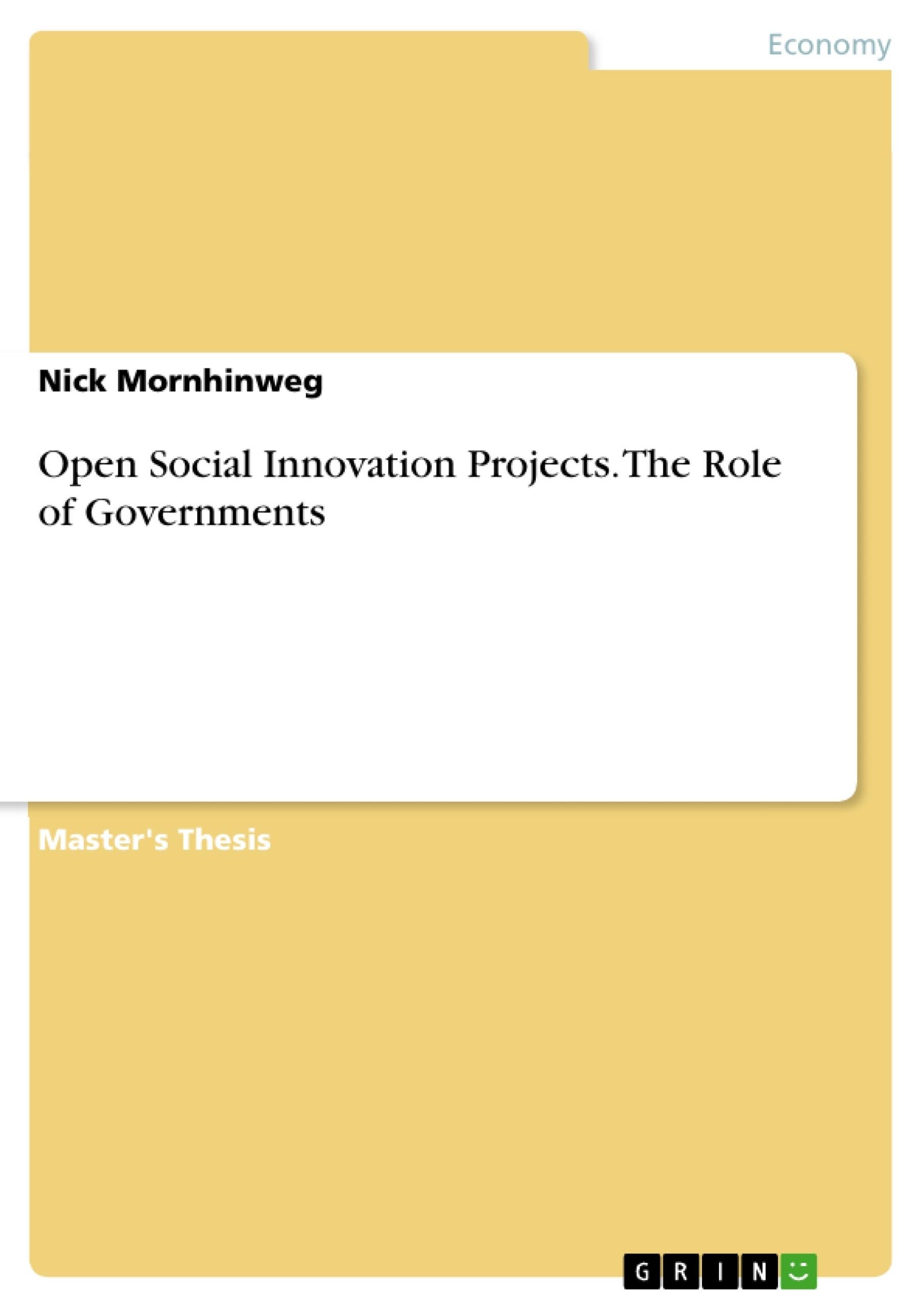This work was the first attempt at creating and assessing a framework of governments role within the open social innovation space as well as testing the roles correlation with perceived project success.
Open social innovation (OSI) is a framework applicable in the context of social issues in an increasingly complex world. It is an extension of open innovation (OI) into the social sphere, particularly incorporating concepts of social innovation (SI). OI is conceptualized as innovation, based on the flow of information beyond and across organizational limits. SI is concerned with providing or developing goods with public goods characteristics, hence non-excludable and non-rivalrous goods, contributing to societal well-being. Thus, SIs are addressing non-monetary objectives, such as social needs or social values. Thus, OSI is defined as innovation founded interorganizational knowledge flows along a business model to derive social change. Innovation is generally described as part of the process ensuring organizations survival and growth by renewing services, products or processes. SI, and consequentially OSI, can be characterized by an absence of financial incentives for participation and are thus generally at risk of being underproduced. Recent research indicates that the involvement of governments in OSI projects might bridge this shortfall, and that governments' engagement might be a crucial determinant of OSI as well as of its potential outcomes. However, it is hitherto unclear how governments act within OSI.
Inhaltsverzeichnis (Table of Contents)
- 1. Introduction
- 2. Conceptual background.
- 2.1 Incentives for innovation..
- 2.2 Social innovation .....
- 2.3 Open innovation
- 2.4 Open social innovation.
- 2.4.1 Open innovation in a social context..
- 2.4.2 Governments in open social innovation....
- 3. Typology conception ......
- 3.1 Typology formulation..
- 3.2 Typology of governmental roles in OSI.
- 4. Methodology.
- 4.1 Sample frame.....
- 4.2 Survey method.....
- 5. Results
- 6. Discussion....
- 6.1 Theoretical implications.
- 6.2 Practical implications
- 6.3 Limitations and future research.
Zielsetzung und Themenschwerpunkte (Objectives and Key Themes)
This paper aims to explore the roles of governments in open social innovation projects. It examines the conceptual background of open innovation and social innovation, and investigates the role of governments in facilitating open social innovation projects. The study presents a typology of governmental roles in open social innovation and examines the relationship between these roles and project success.
- Open innovation and social innovation
- Governmental roles in open social innovation
- Typology of governmental roles in open social innovation
- Relationship between governmental roles and project success
- Theoretical and practical implications of the study
Zusammenfassung der Kapitel (Chapter Summaries)
- Chapter 1 provides an introduction to the topic and outlines the research questions of the study.
- Chapter 2 presents the conceptual background of the study, including definitions and discussions of open innovation, social innovation, and open social innovation. This chapter also explores the potential incentives for innovation and the roles of governments in facilitating open social innovation.
- Chapter 3 focuses on the typology conception and formulation of governmental roles in open social innovation projects. It describes the theoretical framework and its application in identifying and categorizing different roles.
- Chapter 4 outlines the methodology employed in the study, including the sample frame, data collection methods, and data analysis techniques.
- Chapter 5 presents the results of the empirical study, analyzing the data collected and drawing conclusions about the relationship between governmental roles and project success.
- Chapter 6 discusses the theoretical and practical implications of the research findings, considering potential limitations and avenues for future research.
Schlüsselwörter (Keywords)
The primary focus of this research paper is on open social innovation, governmental roles, typology of governmental roles, project success, and the relationship between these elements. The study aims to advance the understanding of how governments can effectively contribute to the development and implementation of open social innovation projects. This research examines these key concepts within the context of a broader field of innovation and social change, exploring the dynamic interplay between governmental action and the emergence of innovative solutions to societal challenges.
Frequently Asked Questions
What is Open Social Innovation (OSI)?
OSI is an innovation framework that combines open innovation (interorganizational knowledge flows) with social innovation to address social needs and create societal well-being.
What is the role of governments in OSI projects?
Governments can act as facilitators, funders, or partners, helping to bridge the lack of financial incentives inherent in social innovation.
How does the paper measure project success in OSI?
The research tests the correlation between specific governmental roles and the perceived success of open social innovation projects.
Why is OSI often underproduced?
Due to the absence of direct financial incentives and its focus on public goods (non-rivalrous and non-excludable), social innovation risks being neglected by the private market.
What is the difference between Open Innovation and Social Innovation?
Open Innovation focuses on information flow across organizational boundaries, while Social Innovation focuses on meeting social needs and creating social value.
- Quote paper
- Nick Mornhinweg (Author), 2021, Open Social Innovation Projects. The Role of Governments, Munich, GRIN Verlag, https://www.grin.com/document/1365148



